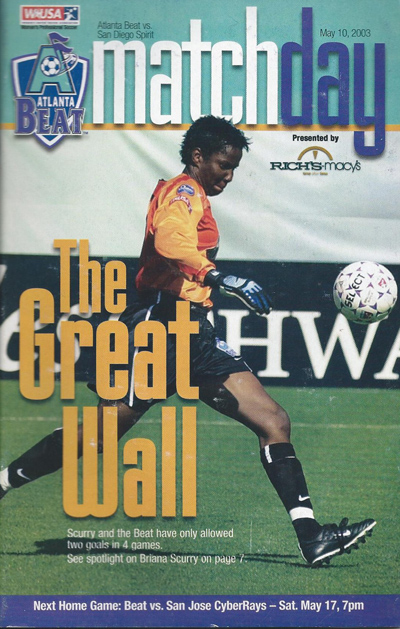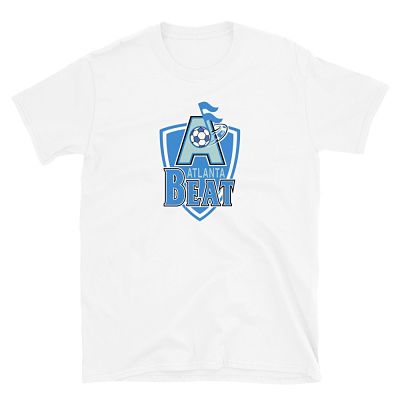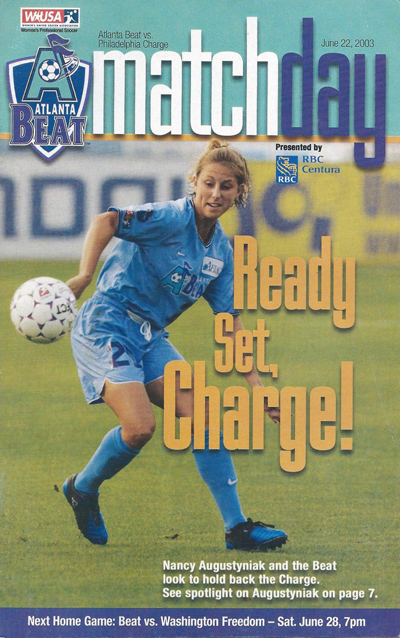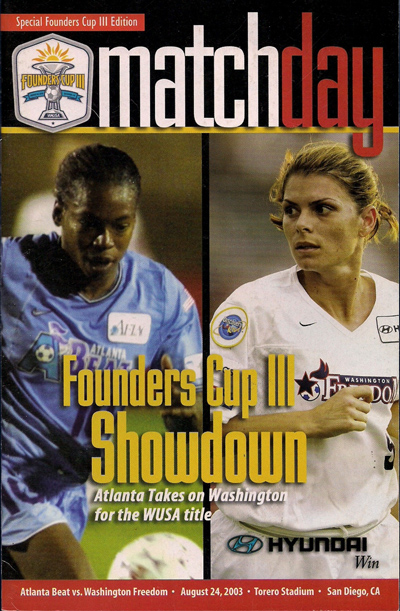Women’s United Soccer Association (2001-2003)
Tombstone
Founded: March 30, 2000 – WUSA founding franchise
Folded: September 15, 20031Parker, Wendy. “Citing money woes, WUSA votes to fold”. The Constitution (Atlanta, GA). September 16, 2003
First Game: April 21, 2001 (T 0-0 vs. New York Power)
Last Game: August 24, 2003 (L 2-1 vs. Washington Freedom at San Diego, CA)
Founders Cup Championships: None
Stadia
2001: Bobby Dodd Stadium (17,271)
Opened: 1913
2002-2003: Herndon Stadium (15,011)
Marketing
Team Colors: Columbia Blue, Purple & Sea Foam Green
Ownership
Investor/Operator: Cox Enterprises, Inc.
Attendance
The steep drop off in Atlanta Beat attendance between the 2001 and 2002 seasons coincided with the team’s move from Bobby Dodd Stadium at Georgia Tech to Herndon Stadium in Morris Brown College.
Tilting your mobile device may offer better viewing.
Sources:
- Parker, Wendy. “WUSA’s first report card”. The Constitution (Atlanta, GA). August 16, 2001 (2001 Beat figure)
- 2002 Boston Breakers media guide (2002 WUSA figure)
- Bickelhaupt, Susan. “WUSA opts to suspend operations”. The Globe (Boston, MA). September 16, 2003 (2002 & 2003 figures)
Record Book
WUSA Goalkeeper-of-the-Year
- 2003: Briana Scurry
OUR FAVORITE STUFF
Atlanta Beat WUSA
Logo T-Shirt
The Beat were Georgia’s original women’s pro soccer club and they were terrific. With a roster of outstanding internationals including Briana Scurry (USA), Charmaine Hooper (Canada) and Sun Wen (China), the club appeared in two of the three WUSA Founders Cup championship games, but lost in a shootout in 2001 and in extra time in 2003.
This WUSA-era Beat ogo tee is available from American Retro Apparel in a variety of colors and in sizes small through XXXL available today!
When you make a purchase through an affiliate link like this one, Fun While It Lasted earns a commission at no additional cost to you. Thanks for your support!
Background
Perhaps the best all-around team in the pioneering Women’s United Soccer Association, the Atlanta Beat were the only club to make the playoffs in all three of the WUSA’s seasons. But they never captured a Founders Cup championship. The Beat advanced to the title match twice, losing Founders Cup I to the Bay Area CyberRays in 2001 and losing the third and final Founders Cup to the Washington Freedom in 2003.
Under Head Coach Tom Stone, the Beat boasted a strong attack with Canadian international Charmaine Hooper and U.S. World Cup veteran Cindy Parlow up top and Japanese star Homare Sawa organizing the midfield. Chinese superstar Sun Wen – FIFA’s Female Player-of-the-Century, along with Michelle Akers – was expected to be a major star for Atlanta. Wen was limited to only five starts by injuries in 2001 and retired from club play after the 2002 season. Nevertheless, Wen regained her form in the 2001 playoffs, helping lead the Beat to the final and scoring a goal in the championship game.
The defense was even stingier. The Beat conceded the fewest goals in the WUSA’s inaugural season. Goalkeeper Briana Scurry was one of the Beat’s most recognizable stars, having backstopped the United States in their thrilling World Cup final victory over Sun Wen’s Chinese team in 1999.
2001 Inaugural Season
The 2001 Beat had the league’s best regular season record in 2001 at 10-4-7. The playoffs were terrific, with the Beat escaping the Philadelphia Charge 3-2 in the semis thanks to a golden goal by Cindy Parlow. That earned the Beat a trip to face the Bay Area CyberRays at Founders Cup I at Foxboro Stadium in Massachusetts. Atlanta and Bay Area were the two strongest defensive sides in WUSA in 2001, but the match turned out to be a barnburner. Kylie Bivens, Hooper and Wen scored for Atlanta, but the CyberRays kept pace and the matched was knotted at 3-3 after regulation and overtime. Bay Area finally prevailed 4-2 on penalty kicks after Hooper and Wen failed to convert.
2002 Move To Herndon Stadium
In 2002, the Beat came into the WUSA’s second season as prohibitive favorites for the title. Most of the roster returned intact and Wen was healthy for the first time. The club also left cavernous Bobby Dodd Stadium on the campus of Georgia Tech University for 15,000-seat Herndon Stadium at Morris Brown College, where they would play their final two seasons. The season was a disappointment, with the Beat finishing 4th at 11-9-1 and falling in the semi-final 2-1 to the eventual champion Carolina Courage.
2003 Return to Finals & Demise of WUSA
In 2003, the Beat regained their form, finishing with the second best record in the WUSA at 9-4-8. The Beat would play in the last match in the WUSA’s brief history when they faced the Washington Freedom at San Diego’s Torero Stadium in the Founders’ Cup III championship game on August 24, 2003. Charmaine Hooper scored on a PK for the Beat in the first half, but Atlanta couldn’t contain Washington’s budding young superstar Abby Wambach, who scored a pair for the Freedom, including the game winner in overtime.
The WUSA folded three weeks later, falling victim to lack of corporate sponsor interest and weak television ratings, among other woes.
Revival
After five seasons without a fully professional women’s league in the United States, Women’s Professional Soccer (WPS) launched in 2009. For the league’s second season in 2010, WPS added an expansion franchise in Atlanta known as the Atlanta Beat. The new Beat revived the old WUSA-era name and logo (although with new colors), but otherwise bore no connection to the old club. They played at a new soccer-specific stadium out in the suburbs and no original Beat players returned to play for the new WPS franchise. The new Beat played two seasons (2010-2011) before folding.
Atlanta Beat Shop
Atlanta Beat Video
Japanese international midfielder Homare Sawa in action for the Beat against San Diego. June 1, 2002
Morris Brown College’s Herndon Stadium, home of the Beat during the 2002 and 2003 seasons, was abandoned in the early 2000’s due to the college’s financial troubles. This stunning aerial video from 2016 shows the shocking decay of the Beat’s former home.
Links
###





One Response
Great stuff Andy! Although the ReBeat had no connection with the OG Beat other than the name, they actually had some of the players from the WUSA days appear at one of the games in 2011. I can’t remember exactly what happened, but I think the players came out in the first half to throw some mini-balls or shirts into the crowd and the announcer said they would be back at halftime for a presentation, which they botched in typical ABeat fashion either by never actually having the presentation at all or not announcing the players’ names (can’t remember which, I just remember thinking “oh, how embarrassing”).